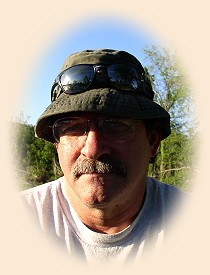|
After reaching the lake I had just one hour to fish.
That wasn't enough time to fool with un-racking and
rigging (then un-rigging and racking) my canoe, so I
would have to be a bank fisherman.
Northeast Kansas had been in the grip of a terrible hot
spell, but a cold front had moved through the night before,
bringing rain. A residual north wind, in fact, was still
blowing. The spot that made the most sense to me was on
or near the lake dam. The dam would block the north wind
and make casting easier, plus the depth at the dam would
drop fast into cooler water, and cooler water is where
the 'gills ought to be.
The east end of this dam is better fishing than the west
end, at least I think so. Pulling onto the road shoulder
just past the east end, I discovered that three people
were already fishing this corner of the dam, occupying
the exact spot I wanted to hit. Oh well, that's how it
goes sometimes. I parked and decided to give it a go
anyway.
After lining up my rod, I walked down near them on my
way toward the face of the dam. This looked to be a
family group - middle-aged Dad and his two handsome
teenage sons. They appeared to be of Asian heritage:
Indonesian, Vietnamese, Cambodian or Laotian. And boy,
they were catching panfish real well using ultra-light
spinning tackle teamed with worms and bobbers. They
were keeping their fish, too.
I wasn't presently disposed to keep anything I caught,
so as I passed behind them I first asked Dad if he and
the boys intended to fish their way west along the face
of the dam. If so, I would walk much farther west before
descending to the water, so's to leave them plenty of
room to move and spread out.
"No," said Dad, "We'll stay here, but thanks."
"Well, hey, look, I wasn't planning to keep any fish
myself today, but if you'd like I'll be happy to put
any good ones I catch on a stringer and give them to
you when I'm done. Won't be very many because I need
to leave in an hour," I offered.
"Yes, thank you!" Dad said. "Start fishing anywhere
over there, you won't bother us at all."
Alright, a mission! I felt confident assuming that
both these teenage boys could eat half their weight
in bluegill fillets at one sitting. It's just how
teenage boys can eat, so Dad might could use some
extra firepower putting enough meat on the table.
I was happy to help.
I tippy-toed at an angle down the face of the dam to
the water, squared up and began throwing a #12 Hare's
Ear Nymph, this fly selected on the assumption that if
any gills were holding near the dam they would relish
the sight of a nymph struggling slowly through the
cooler water. Poor, poor, pitiful nymph.
It took about 10 minutes, but I finally connected with
a keeper-size 'gill. My stringer is a homemade affair:
8 feet of brown 100-lb. test braided nylon trotline cord.
25-cent piece sized bowline knot loop on one end, and a
match-melted sharp point on the sticker end.
Holding the 'gill, I ran my closed forceps into the fish's
mouth and stuck the point through the thin membrane just
below the lower lip. Opening the forceps, I grabbed the
point of the stringer and pulled the tip back through.
This accomplished, I slid the fish down the length of
the stringer then ran the melted tip of the line through
the bowline loop. Tying a quick-release bowline loop to
the pointed end, I clipped the loop into my key ring
carabiner and the fish was secured.
About 30 minutes later I heard Dad call out, "We go now!"
Time to report in and deposit my catch, which by then was
eight or nine bluegills, the largest maybe 7 inches long
but most around 5 inches.
When I reached Dad, I looked down into his 5-gallon paint
bucket and saw that it was two-thirds full of bluegill.
The fish lying on top of this haul were really good ones.
As Dad helped me un-string the fish I'd caught, I was
aware that his were significantly bigger 'gills than mine.
(Shoot, I hadn't even long-line released any as big.) No
matter; he accepted my comparatively itty-bitties graciously.
Better small than not at all.
We introduced ourselves, and I wish I could remember his
name. But you can't remember what you never knew; I tried,
but his was a traditional Asian name given to him in his
former nation and I just couldn't pronounce it, couldn't
even mimic its sound. Damn embarrassing.
"It's a good thing, you bringing your sons here to fish
with you," I told him. "They'll surely get into fishing
for other, bigger things, but they'll always remember
days like this, and bluegill, for how much fun they are
to catch, and for how good they are to eat."
"Yes," smiled Dad, and they left up the shore to get in
their truck.
It made me feel good to see somebody at this lake fishing
for bluegill for food. Someone other than myself. What
you see here - what you see practically everywhere,
actually - is people going after largemouth bass exclusively.
My Navy service was on an aircraft carrier that operated
off North Vietnam. I never got to meet or get to know any
Southeast Asian people. But I understand they traditionally
eat lots of fish in their diet. So there was no doubt in my
mind that the bluegills Dad and his boys took from here
today would not be wasted. Back at the Ponderosa there
would be none of this "well, I'm too tired to clean all
these little fish, I'll just throw them away". Not with
this family. And twenty bucks says Dad and Mom have already
forgotten more ways to cook panfish than I know. They'll
teach those cooking skills to their sons, I imagine.
Not only that, but maybe seeing me do half-way good with my
fly tackle will one day inspire those young fellas to give
fly fishing a try. They're already good fishermen. I didn't
present them with overwhelming evidence today, but worms don't
always trump flies. ~ Joe Hyde
About Joe:
 From Douglas County, Kansas, Joe is a former municipal and
federal police officer. In addition to fishing, he hunts
upland birds and waterfowl, and for the last 15 years
has pursued the sport of solo canoeing. On the nearby
Kansas River he has now logged nearly 5,000 river miles
while doing some 400 wilderness style canoe camping
trips. A musician/singer/songwriter as well, Joe's
'day job' is with the U.S. General Services Adminstration.
From Douglas County, Kansas, Joe is a former municipal and
federal police officer. In addition to fishing, he hunts
upland birds and waterfowl, and for the last 15 years
has pursued the sport of solo canoeing. On the nearby
Kansas River he has now logged nearly 5,000 river miles
while doing some 400 wilderness style canoe camping
trips. A musician/singer/songwriter as well, Joe's
'day job' is with the U.S. General Services Adminstration.
Joe at one time was a freelance photojournalist who wrote the
Sunday Outdoors column for his city newspaper. Outdoor
sports, writing and music have never earned him any money,
but remain priceless activities essential to surviving the
'day job.'
|

 From Douglas County, Kansas, Joe is a former municipal and
federal police officer. In addition to fishing, he hunts
upland birds and waterfowl, and for the last 15 years
has pursued the sport of solo canoeing. On the nearby
Kansas River he has now logged nearly 5,000 river miles
while doing some 400 wilderness style canoe camping
trips. A musician/singer/songwriter as well, Joe's
'day job' is with the U.S. General Services Adminstration.
From Douglas County, Kansas, Joe is a former municipal and
federal police officer. In addition to fishing, he hunts
upland birds and waterfowl, and for the last 15 years
has pursued the sport of solo canoeing. On the nearby
Kansas River he has now logged nearly 5,000 river miles
while doing some 400 wilderness style canoe camping
trips. A musician/singer/songwriter as well, Joe's
'day job' is with the U.S. General Services Adminstration.